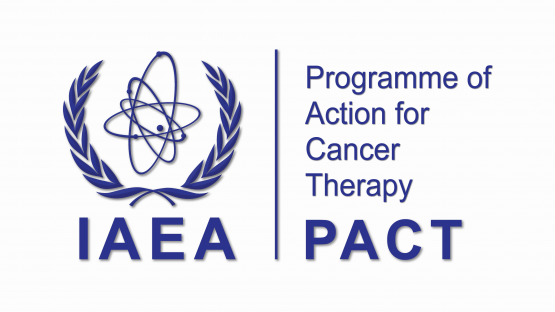Cancer isn't Zimbabwe's biggest problem. But it's growing. Too fast for cancer care and treatment to keep up. The IAEA and partners are trying to turn the situation around.
“Too many of our cancer patients wait forever,” says Dr. Ntokozo Ndlovu. She should know. As head of Radiotherapy Oncology at Zimbabwe's Parirenyatwa Hospital, Harare she has been waiting alongside them.
Dr. Ndlovu, born, raised and educated in Zimbabwe, is trying to shorten the wait. She and others in this country of 12 million people are pushing through initiatives that aim to raise the level and quality of cancer care. Since the mid-1990's Zimbabwe has been receiving assistance under the IAEA's Technical Cooperation Programme to upgrade facilities and staff training for radiotherapy. In fact, together with South Africa, Zimbabwe has been providing cancer care to many African patients. But over the last few years, cancer treatment for the country's most common cancers has come to a halt. At present, all three radiotherapy machines in Zimbabwe — two in Harare and one in Bulawayo — are not working. The one trained repair engineer has left the country and the maintenance fees charged by suppliers are out of reach for the government budget.
“We see cases where curable cancers become incurable due to our deficiencies in equipment,” Dr. Ndlovu says.
With renewed interest from the government, Dr Ndlovu looks to the IAEA for help. “Pieces of the IAEA-supported activities are coming together,” says Mr. Lameen Abdul-Malik, the IAEA's Programme Management Officer. “That includes upgrading treatment facilities to keep people working there, improving safety in the workplace, fixing and maintaining radiotherapy machines, and resuscitating the staff training once in place.”
On the ground in Zimbabwe, experts recruited by the IAEA are repairing the life-saving machines and training more technicians to maintain the equipment. Early in 2007, it's expected that radiotherapy services will once again be fully available. “We're seeing light at the end of the tunnel,” Mr. Abdul-Malik says. “Individuals like Dr. Ndlovu and our experts show how people working together can make a difference.” Over the next few years the IAEA will help Zimbabwe establish a more comprehensive and sustainable cancer care service with special emphasis on improving teaching programmes in medical physics and radiation oncology. This support - together with national efforts to raise substantial funds from the private sector and other donors for new cancer treatment machines - should lead to higher levels of cancer care. Other steps are planned through an IAEA-backed global initiative called PACT (Programme of Action for Cancer Therapy). Programme experts plan to visit Zimbabwe in 2007 to help mainstream cancer into the country's health care policy.
“Across much of Africa, there is almost no cancer prevention or public education,” explains Mr. Massoud Samiei, the Head of PACT. “There is almost no screening for breast and cervical cancer in women even though, if detected early, both can be successfully treated. And radiotherapy, which is used effectively on more than 50% of cancer patients in high-income countries, is simply unavailable to millions of cancer sufferers.”
The “sufferers” included six-year-old David in Harare.
David faced closed doors for treatment when it was discovered he had cancer of the salivary gland, Dr. Ndlovu recalls. In richer countries, David would be moving on with life. His type of cancer in the industrialized world has a 68% survival rate. But when no radiotherapy machines were working in Zimbabwe, David's turn for treatment never came. Dr. Ndlovu recounted David's story in November 2006 at the IAEA conference on Quality Assurance and New Techniques in Radiation Medicine attended by 500-plus professionals. She spoke of the realities of radiotherapy services in poorer countries like her own.
“The will is there,” she says. “It comes down to a lack of funding and understanding the problems of delivering health care in developing countries. With the right help, we can find the way forward.”
Background
- Zimbabwe sees, on average, 7000 cancer cases each year. Only a fraction of these — some 1300-2000 — are treated with radiotherapy.
- At present levels of care, cancer patients in Harare are not likely to survive five years after diagnosis, according to a study published in the International Journal of Cancer.
- HIV infection rates are high in Zimbabwe and life expectancy is low. The AIDS pandemic is augmenting the rate of HIV-related cancers, namely kaposi sarcoma, a kind of skin cancer that accompanies the disease.
- Among women, Zimbabwe has a high rate of cervical cancer, which if detected early can be effectively treated.


